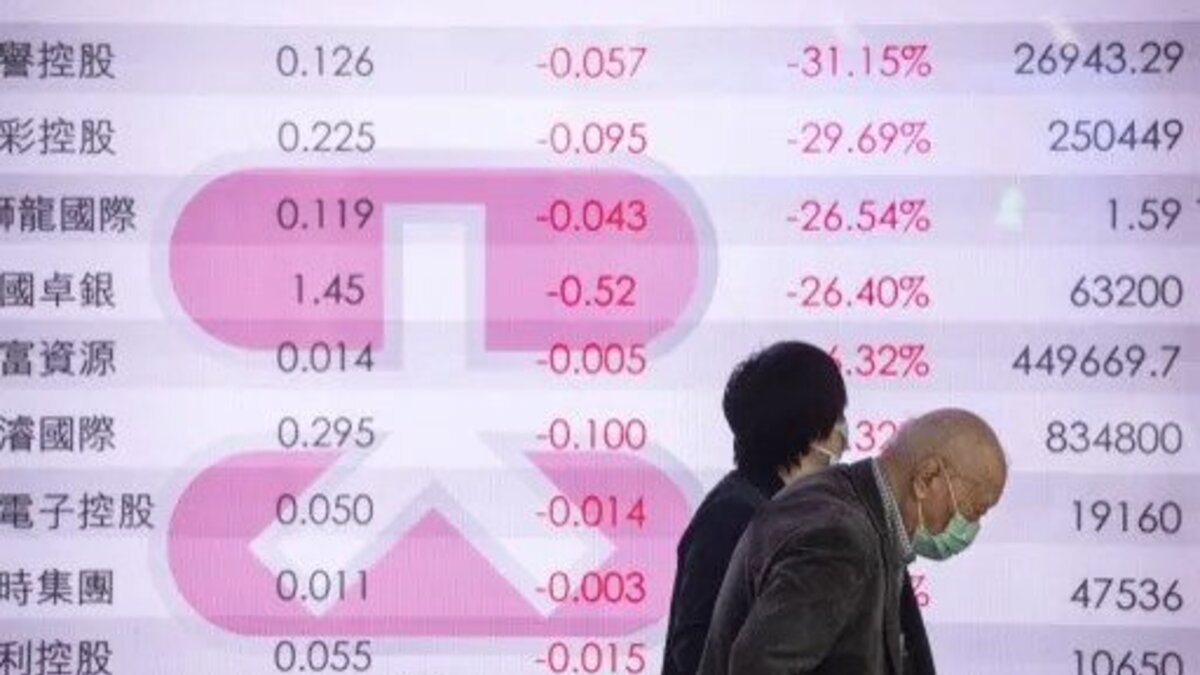[ad_1]
Hong Kong’s stocks were on a roller-coaster ride on Tuesday as mainland capital reportedly bought A-shares in a bid to offset downward pressure on Chinese markets amid global inflation fears.
Following a 2.4% decline in the Nasdaq Composite on Monday, Hong Kong’s benchmark Hang Seng Index fell by 0.75% to 28,326, the lowest level since the end of January, at 9:45 am today.
The index then rebounded to 29,000 at 11:15 am as media reports said Beijing had ordered mainland capital to purchase A-shares. It closed up 0.81% at 28,773 at today’s final bell.
Some analysts suggested that the Chinese government wanted to stabilize stock markets during the “two sessions,†the annual meetings of the National People’s Congress and the Chinese People’s Political Consultative Conference now underway in Beijing.
Heavyweight Hong Kong-listed stocks had mixed performances. Tencent’s shares rose 0.23% to close at HK$644 on Tuesday. In the morning, the shares first fell by 4.6% to HK$613 (US$78.97) and rebounded to HK$664.5, up 3.5% from Monday, before they fell again in the afternoon.
The shares recorded a high of HK$775.5 on February 18 but have since retreated. They were still 13.8% higher from HK$566 at the end of last year.
Geely Automobile Holdings ended at HK$22.45, up 1.81%, on Tuesday. The Chinese automaker recorded a high at HK$36.45 on January 26 and stayed at the HK$29 level last month.
Shares of the Hong Kong Exchanges and Clearing dropped 2.25% to HK$440.8 on Tuesday. They were still 3.5% higher from HK$425 at the end of 2020 but they were 22.3% down from the peak at HK$567 on February 19.
HSBC Holdings Plc rose 2.09% to HK$48.75 while Alibaba Group increased 1.54% to HK$224. PetroChina dropped 2.62% to HK$2.97.
The Hang Seng Tech Index, which tracks the the 30 largest technology companies listed in Hong Kong, declined 0.23% to 8,063.
Market analysts said major Chinese technology stocks would continue to face downward pressure as their tech counterparts in the United States have been declining the last two weeks due to rising US bond yields, which reflected an increase in global inflation expectations.
Kuaishou Technology increased 2.26% to HK$272 on Tuesday. Making its debut on the Hong Kong stock exchange on February 5, the company’s shares rose 185% to HK$300 from the offer price of HK$115 on the first trading day. They surged further to hit HK$415 on February 17 before falling down to below HK$300 this month.
Xiaomi fell 1.79% to HK$21.95, the lowest in five months. The shares recorded high at HK$35.3 on January 5. Meituan were down 2.2% to HK$302 on Tuesday. The online shopping platform’s shares peaked at HK$451.4 on February 17. JD.com decreased 2.74% to HK$327. The shares were down 4.4% from HK$342 at the end of last year.
It was reported that mainland capital had purchased A-shares from the insurance and spirit sectors on Tuesday morning, but the booster effect failed to sustain the market in the afternoon. The Shanghai Composite Index ended down 1.82% at 3,359 at 3 pm on Tuesday while the CSI 300 Index slumped 2.15% to 4,971. Shenzhen Component Index plunged 2.8% at 13,475.
Ping An Insurance fell 1.06% to 84.05 yuan (US$12.9) while China Pacific Insurance dropped 1.79% to 42.16 yuan. New China Life Insurance decreased 0.87% to 52.51 yuan.
Kweichow Moutai’s shares lost 1.17% to 1,936.99 yuan on Tuesday. They hit 2,000 yuan at 1:15pm but then retreated. The shares recorded high at 2,601 yuan on February 10. They have declined 3% so far this year. Wuilangye Yibin, another Chinese spirit maker, dropped 0.82% to 242.5 yuan while Luzhou Laojiao slashed 4.3% to 187.21 yuan.
Hong Kong’s individual investors, who have suffered 20-30% loss in their investments in Chinese technology stocks since late February, are longing for another round of mainland cash flowing southbound but they’ve so far been disappointed.
On Tuesday, a net amount of HK$8.87 billion of southbound fund sold Hong Kong stocks while a net amount of 2.43 billion of northbound funds purchased A-shares through the Stock Connect program, according to the Hong Kong stock exchange.
In late January, Hong Kong’s stock markets were boosted by an influx of mainland capital after it was clear that Joe Biden won the US presidential election, ousting the China-bashing Donald Trump.
On March 2, Guo Shuqing, chairman of the China Banking and Insurance Regulatory Commission (CBIRC), said in a media briefing that he was worried about risks emerging from bubbles in global financial markets and China’s property sector.
He said the economies and stock markets in the US and Europe were heading in the opposite direction. He said asset bubbles in the two regions could burst while their stocks would have to face a correction soon.
Dickie Wong, executive director of research at Kingston Securities, said the rebound on Tuesday morning could be a sign that the correction of Hong Kong stocks had finished. Wong said with the Hang Seng Index having strong support at 28,300, Hong Kong stocks would probably remain stable at the current level. He said investors should not expect stocks would bounce back to January levels in the short term.
Ravi Wong, a research director at China Vered Securities Ltd, said people should remain cautious as market corrections had not yet finished. He said the global stock markets would continue to be under pressure due to the rising US bond yields.
He said if there were small rebounds in the coming few days, investors should sell some of their new economy stocks and focus more on traditional blue chips. Wong said the automobile sector would benefit from China’s plan to produce more new energy vehicles but it was unlikely for Geely Automobile Holdings to go back to the HK$29-30 level in short term. He predicted Geely would trade between HK$21 and HK$25 in the short run.
Read: China moves to pinprick emerging property bubble
Read: Hang Seng Index overhaul to reflect new market realities
[ad_2]
Source link










